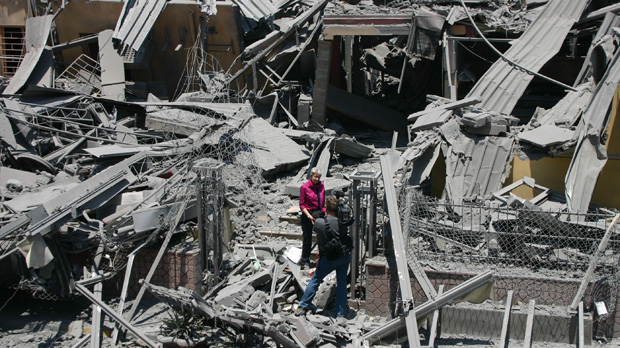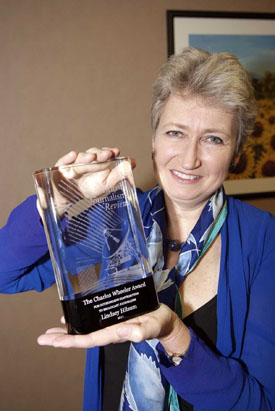Lindsey Hilsum: ‘best reporting is evidence of own eyes’
 Lindsey Hilsum
International Editor
Lindsey Hilsum
International Editor
International Editor Lindsey Hilsum talks from Libya to Channel 4 News Facebook followers about life on the road, reporting from war zones and how she maintains a fresh supply of silk scarves.

Lindsey Hilsum (pictured reporting from Libya on 16 June) answers questions – put to her by Channel 4 News viewers on Facebook.
Hermine Fagbehouro: After witnessing so many atrocities what is ur take on life? R u able to ever switch off?
Lindsey Hilsum: My take on life is that I’m incredibly lucky to get to the places I go to, and report what I see, so I’d better make the most of it while I can. I’ll switch off when I’m old and decrepit!
Fifi Suki: Are there stories that you deliberately ignore, choose not to cover, and if so why?
LH: For 10 years I didn’t cover the story of rape in the DR Congo because I couldn’t face it again. I had spent a lot of time there in the late nineties and thought it was the most godforsaken place on earth. And I felt that many journalists reported these atrocities and nothing changed.
But last year two young journalists contacted me after going there, and I felt really guilty that they went out and did it while I had given up. So I went back. Still, nothing seems to change. But at least I reported it again, which is what I can do.
Without getting sentimental, I do believe in a common humanity and the connections I find I can make despite culture. Lindsey Hilsum
Peter Bayley: Lindsey, from your close-up viewpoint [in Libya], are we spending millions only to make things worse?
LH: Hard to say. The people I met in eastern Libya would certainly say no, they want the NATO bombing. Many people here in Tripoli quietly say that too. But the question is, what comes next?
The danger is that if Colonel Gaddafi is killed or ousted in a palace coup, there will be a vacuum filled by looting, crime and chaos. Here the state and the regime are one and the same. So maybe negotiations will end up being the way forward. How we get from here to there, I don’t know.

Louise Devlin: do you still feel like a westerner despite always reporting from the Middle East and beyond?
LH: Yes. I look like a westerner and I guess I think like one too. But – without getting sentimental – I do believe in a common humanity and the connections I find I can make despite culture. Especially with women. One reason I don’t mind wearing the headscarf is that it means I share an experience with ordinary women in the Middle East, and that’s interesting and makes me less of an outsider.
Emma German: I wonder if you have ever lost your journalist’s detachment and intervened in events you were reporting on?
LH: When the American marines turned up in Baghdad in 2003 we witnessed them shooting at a passing car. A little girl was shot in the head. Our fixer, Mohammed, ran across the road and saved her. Then he and other members of our team brought across two more injured people.
We shouted at the Americans to patch them up – which they did. The little girl, who was five and called Zahra, was flown to Kuwait for surgery. We visited her and her family several times after they returned to Iraq.
It was Mohammed who saved her, not me, but it was an occasion when our team intervened and I definitely didn’t feel detached! But what kind of a human being would feel detached about a five-year-old being shot in the head?
James Mackenzie: If you were advising the Libyan rebels, what would you say would be the weakest point of the Gaddafi government, and the least bloody way to overturn it? Conversely, is there any way back to full control for Gaddafi?
LH: Well, it’s not my job to advise the Libyan rebels or Colonel Gaddafi! But I would say that while Gaddafi is increasingly isolated, I don’t see him giving up power at this time, and I’m wondering if there’s any way for a negotiation which would gradually ease him out of the picture, given that he has lost a lot of power and influence.
That might be less bloody than overthrowing and creating a vacuum. But I understand why many resist this idea, because they think he’ll just use the opportunity to attack his enemies. I’m glad I’m a reporter not a diplomat or politician!
I can think of so many countries with repressive leaders, and I wonder why on earth don’t they rebel? Yet you can rarely predict the trigger. Lindsey Hilsum
Nicholas Hughes: The Arab spring, why didn’t the west see it coming? And is it already starting to wane?
LH: Well, who saw the fall of the Berlin Wall coming? We thought the Cold War was forever. And then, all of a sudden, in one year, it was over. Political scientists, politicians, journalists – we all have a bad record of prediction. And afterwards everyone says it was “inevitable”! I think it’s because in all these situations there are too many variables.
I can think of so many countries with repressive leaders, and I wonder why on earth don’t they rebel. Yet you can rarely predict the trigger. I don’t think it’s waning, but I do think it’s changing shape and turning into conflict not revolution. Tunisians and Egyptians are lucky.
More from Channel 4 News: Lindsey Hilsum wins Charles Wheeler award
James Daniel Bike Steel: Being a strong woman of a few cultures, how do you do to balance your own, ever changing identity and how do you see the woman’s role changing in the Middle East?
LH: Not sure my identity is always changing… I think it’s pretty firm. I identify myself as a journalist more than anything else, and – although of course that’s based on western ideas – I still think it transcends culture. Women’s role is changing in the Middle East, but not always for the better. I get the feeling that Egypt is less free for women now than it was 20 years ago. Maybe this uprising will change that. Inshallah – as they say.
Meliha Avdic: Was there ever a time you found the conflict too complex to report – where, when, why? Was there ever a time you wanted to change a report you made, due to new findings?
LH: It’s always too complex! I struggle with every story to make it comprehensible, but not simplistic. I always worry about the details and complexities I have to omit because of limited time, and for clarity.
The cliche is that journalism is the first rough draft of history and it’s true. Frequently, new information comes to light later which shows that we didn’t really understand what was going on at the time. That’s why I often hedge my reports, using words like “may” or “could” because I’m aware of the dangers of being too confident. The best reporting is the evidence of one’s own eyes – but you even have to be careful with that, because things are not always as they seem. Today the Libyan government took us to a hotel which had been bombed. It was indeed a hotel – that checked out. But was it something else as well? I don’t know.
More from Channel 4 News: Lindsey Hilsum named One World's Journalist of Year
Nick James Poad: How do you maintain a supply of freshly laundered scarves and jackets when on location in a warzone for four months?
LH: Aha! Scarves are pretty light so I carry lots and often buy more on my travels. I’m an obsessive scarf shopper – ask my long-suffering producer! As for shirts (rather than jackets) I always buy and carry two of each, so if I do a story over a couple of days it looks as if I’m wearing the same thing. Even in warzones there’s usually hotel laundry, so it’s not that difficult.
You can follow @lindseyhilsum on Twitter. Become a fan of Channel 4 News on Facebook.
-
Latest news
-
NHS perinatal staff ‘exhausted, on their knees’, says maternity safety expert4m

-
Ex-Trump lawyer Michael Cohen testifies at hush money trial3m

-
Racial hate speech laws being ‘weaponised’ warns National Black Police Association7m

-
‘Hard to believe so many women going through such horrors’, says woman whose baby daughter was stillborn8m

-
Damning report condemns ‘shockingly poor’ UK maternity services12m

-




